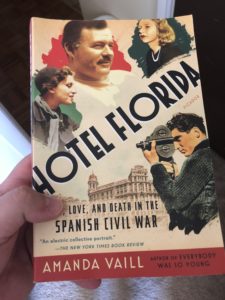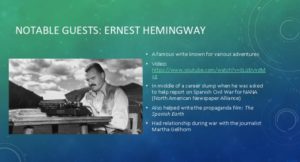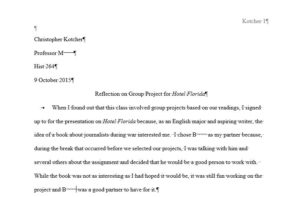Welcome to the cKotch.Com blog. I’m Christopher Kotcher, and this is one modernist writer who surprised me in the worst way.

Always Appreciative
While I did not read much for myself in high school, I still enjoyed many books from my English classes. This fact held true even for books no one else appreciated.
Best example would be Oscar Wilde’s The Portrait of Dorian Gray.
I was the only one in Honors English who had a good time with that book. The premise intrigued me, and the twists all got me. No one else could even stand the characters.
My enjoyment of course texts led me to trust my teachers’ literary tastes. Any book they deemed to be great really seemed to be so.
Then we were assigned Ernest Hemingway’s Old Man and the Sea.
The Old Bore Was a Chore
I was excited to read some Hemingway. He was the man’s man of American authors. He was a daring adventurer who survived plane crashes and wrote in warzones.
Old Man and the Sea won Hemingway a Pulitzer Prize. The book was even cited in his Nobel Prize for Literature. Such honors could only go this great writer’s greatest work.
With eager anticipation, I first opened that book. With reluctant resignation, I closed it the moment I finished the first reading assignment.
The book was boring.
The set-up should have interested me.
An old fisherman named Santiago had gone over eighty days without catching a fish. His peers made fun of him. His young apprentice Manolo believed in him. Still, Manolo’s parents were sending him to study with more successful fishermen.
All Santiago seemed to have left in the world was dreams of past adventures.
That should be a great hook.
A grand story of someone believed to be past his prime rising up again. Proving himself and his experience to those fools who mock him.
Unfortunately, that story is buried in a sea of boredom.
Hemingway was talking way too much, overexplaining everything he could. I had no idea what people were talking about with his style being short and to the point.
I did not need to hear every part of Santiago’s appearance being described as old.
I did not need a long digression on why Santiago calls the sea “le mar” instead of “el mar.” A single sentence would have been good enough. The whole thing barely added to his character.
I hoped things would get interesting when Santiago ran into the giant fish on the book’s front cover.
Even then the action seemed to end too soon. Most of the book became about Santiago bringing the fish back to shore.
At least Santiago had to fend off a few sharks smelling the rotting catch. That was something interesting.
Mostly Santiago just talked about the fish being his brother in nature. That was cool at first but grew weird and repetitive given time.
In the end, Santiago returned home and went to bed. I was worried Hemingway was about to go for an “It was all a dream” ending. Thankfully, he did not.
I think.
While discussing the book in class, no one had kind words for it.
The teacher looked to me and a few other students for a second opinion. For once, I agreed with the crowd.
Not Just the Fish Story
I figured I should not judge Hemingway for one bad book. He had plenty more. I figured I would find one I enjoyed by high school’s end.
Then AP American Literature class woke me from my little dream.
We were covering the modernism movement. Works of writers disillusioned by the world in the wake of the world wars.
As one of the movement’s leaders, Hemingway was included in our coverage. This time, the focus was examining and comparing a few of his shorter works.
The two which most stick out in my mind now are “Hills Like White Elephants” and “Today is Friday.” I could not like either of them no matter how hard I tried.
“Hills Like White Elephants” is a train station conversation about an unwanted pregnancy. These details are somewhat hidden, so the story is typically seen as a puzzle.
Scholars make much about debating the baby’s fate and the couple’s future. Personally, I do not care.
The story is so open-ended that any possibility could be true. Any clue is pointless because Hemingway seemingly designed any interpretation to be valid. Puzzles with too many answers cease to be interesting.
“Today is Friday” features three drunk Roman soldiers at a bar on Good Friday. The story just features them talking about crucifixion as a part of their job.
I suppose this is a unique take on events. Still, I did not feel I got anything from it. There just seemed to be nothing to the scene.
Eventually my teacher decided to sneak in a full Hemingway novel. For extra credit, we could read Hemingway’s great classic A Farewell to Arms and take an essay test on it.
I went along with the assignment. Maybe this could be an enjoyable Hemingway book?
Unfortunately, the answer would prove to be “no.”
The premise seemed good enough.
An American ambulance driver in World War I fell for an English nurse. Complications then ensued. None of them interested me.
Conversations of love and future did not endear me to the characters. They did not appeal to me enough for me to look past their selfish actions throughout the story.
And so, the bitter ending left no impact on me. Hemingway’s most famous book did nothing for me.
Even in College

Hardly anyone could believe I did not like Hemingway’s work.
I was the guy who loved all classics. People assumed I had to have not given the man a chance. They told me all I had to do was read Old Man and the Sea or A Farewell to Arms. Then I would see his genius.
Few had anything more to say after I shared my experience with those books.
I had given Hemingway a chance. I wanted to like his writing.
Hemingway is a cornerstone of modern American literature. He has inspired many other writers I do love, like J.D. Salinger.
Still, I had no taste for anything he wrote.
I would read Hemingway’s short story “The Snows of Kilimanjaro” in college. I did not find it boring like other Hemingway works, but it did not resonate with me. Just another story of a washed-up adventurer dreaming of better days.
Only Hemingway writing which interested me were stories about him rather than stories by him.
One of my honor courses included nonfiction writer Amanda Vaill’s Hotel Florida. The book detailed Hemingway and other writers’ experience as reporters in the Spanish Civil War.
This material actually excited me enough to do a presentation on it. I even choose to do a group project on it with one of my classmates.
I had to wonder how I could remain so interested in a writer whose writing I had never liked.

Ideas of Greatness
Now I think I have some idea of my disconnect between writer and writing.
You see, I knew an idea of Hemingway before I knew his work. Simplest reason to dislike his work is the dissonance between those two things.
I wanted books of adventure written by an adventurer. Instead, I read about failed adventurers.
But I believe there may also be more to this story. After all, adjusting my expectations did not magically make me fall in love with Hemingway’s work.
I believe Hemingway’s themes were not built to resonate with my personality type.
I am a hopeful person. I believe there is good in the world and that human beings can legitimately strive toward truths regarding this goodness.
Hemingway was from a broken world. War unlike anything had just ravaged everything. His was a world where all quest for meaning seemed futile.
I thought Hemingway was someone who found purpose in his adventures. Instead, purpose seemed to be the one thing he never could find.
So, Hemingway’s characters tend to be old, tired, or jaded because that was the state of their author. Possibly, his work was a way to work through those issues he saw in himself.
These characters all get a chance at meaning only to lose. Maybe this is because Hemingway felt he never truly won.
I do not mean to say Hemingway’s fans are all old, tired, or jaded. People can enjoy him for his style or because his work helps them better understand another view of the world. That is probably how I would ever find any personal value in Hemingway’s writing.
Hemingway and I just seem to have two entirely different worldviews. Worldviews that do not really connect well at all.
Hemingway would probably react the same way to my work as I do to his. Still, there could be a place for both of us.
Kotcher’s Call to Action
If you like my content and wish to see more, then you have a few options.
You could check out my book Good Stuff: 50 Poems from Youth on Amazon. Good Stuff is enrolled in the Kindle Matchbook program, so anyone who buys the paperback can also get the eBook for free.
You can also check my Essential Posts page for links to some of my greatest posts to the cKotch.Com blog.
Finally, be sure to like my Facebook page and share it with your friends. I post a link there whenever a new blog post goes live each Friday at 5:00 PM EST.